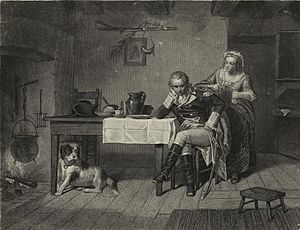Elizabeth Maxwell Steele facts for kids
Quick facts for kids
Elizabeth Maxwell Steele
|
|
|---|---|
 |
|
| Born | 1733 Salisbury, Rowan County, Province of North Carolina
|
| Died | November 22, 1790 (aged 56–57) Salisbury, Rowan County, North Carolina, United States
|
| Children | 3, including John Steele |
Elizabeth Maxwell Steele (around 1733–1790) was a strong supporter of the American Revolution. She helped manage a well-known tavern in Salisbury, North Carolina. This tavern was a popular spot for important people of that time. Being involved with the tavern allowed her to help the American cause. She offered a welcoming place and gave help to others who supported the Revolution.
| Top - 0-9 A B C D E F G H I J K L M N O P Q R S T U V W X Y Z |
Elizabeth Maxwell Steele: A Patriot's Story
Her Early Life and Family
Elizabeth Steele was born in 1733. Her family was from Scotland. They first moved to Pennsylvania Province. Later, they settled in Rowan County, North Carolina, in the Province of North Carolina.
Elizabeth first married Robert Gillespie. They had two children, Robert Jr. and Margaret Gillespie. We don't know much about Robert Gillespie Jr. Margaret Gillespie married Samuel Eusebius McCorkle. He was a Presbyterian preacher and teacher. Robert Gillespie Sr. was killed by Cherokee Native Americans. This happened during a fight at Fort Dobbs in 1760.
After Robert Gillespie died, Elizabeth married William Steele. He was also from Pennsylvania. They had one son together, John Steele. William Steele passed away before the Revolutionary War began. This meant Elizabeth Steele had to raise three children by herself. She also had to run the family tavern in Salisbury alone. She also bought and sold land. This helped her get a small amount of property for herself.
John Steele was Elizabeth's only child with William Steele. William was a merchant and innkeeper. John grew up to be an important person. He was chosen by President Washington to be the comptroller of the U.S. Treasury. He also strongly supported the idea of citizen soldiers. He spoke out against having a large standing army. A book called Papers of John Steele was written about him.
How She Helped in the American Revolution
Elizabeth Steele was a Whig Patriot. This means she supported the American side in the war. She is most famous for helping General Nathanael Greene. This happened on the morning of February 2, 1781. It took place at her tavern in Salisbury, North Carolina.
General Greene came into the tavern for breakfast. He was very tired and sad. He had been riding all night. He had just heard bad news. General William Davidson had been killed by the British. British Lieutenant Colonel Banastre of the Tarleton's Dragoons killed him. Davidson died defending Cowan's Ford. This was on the Catwaba River, near what is now Davidson College. About 15 to 50 of his men also died. This was a big loss for the American war effort. It also put General Greene in a difficult spot. He had been waiting for these men to fight back against the British.
Elizabeth quickly saw that General Greene needed help. She gave him breakfast to cheer him up. When she learned about his difficult situation, she went to the back room. She came back with two small bags. They were full of money, probably her savings from many years. General Greene was very thankful and accepted her gift.
The words she said with the money are written on a memorial. It is at Thyatira Presbyterian Church. The DAR put it there. It says: "Elizabeth Maxwell Steel 1733–1791 -- Immortal Patriotism, By this gift she being dead yet speaketh. Salisbury - Feb. 1, 1781. To Nathaniel Greene in the darkest hour of his career, she gave 2 bags of gold and silver saying: "Take these, General, you need them & I can do without them." This, that this woman hath done, shall always be told as a memorial of her. Oct. 7, 1948. Erected by the E.M.S. Chapter DAR, Salisbury, N.C., descendants & other patriotic citizens."
After meeting Elizabeth Steele, General Greene's luck improved. While still in Salisbury, he found more help from Mrs. Steele. He also discovered over 1,700 American weapons. These had been hidden for the militia. They were then used to help the war effort against the British.
Her Lasting Impact
Elizabeth Steele's help was very important. It greatly improved General Greene's mood and confidence. This soon led to success on the battlefield. He won battles in the days and months that followed. A notable victory was the Battle of Guilford Courthouse in mid-March 1781.
General Greene's biographer wrote about his meeting with Steele. He said that help could not have come at a better time. He also suggested that Greene continued his journey feeling much better. He was encouraged by this touching example of a woman's dedication to her country.
 | George Robert Carruthers |
 | Patricia Bath |
 | Jan Ernst Matzeliger |
 | Alexander Miles |

